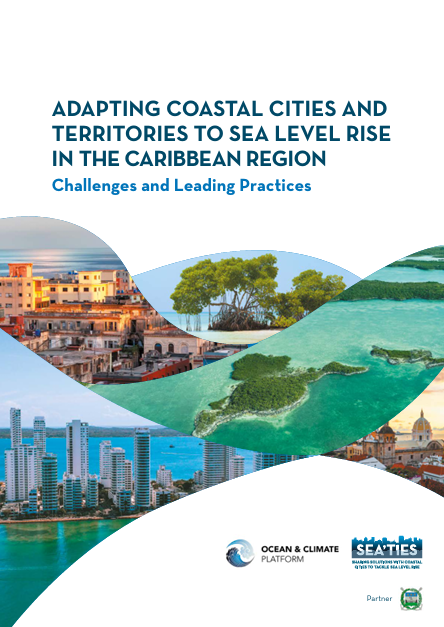Adapting Coastal Cities and Territories to Sea Level Rise in the Caribbean Region: Challenges and Leading Practices
From October 23 to 25, 2024, 44 participants from 12 Caribbean countries and territories met in Pointe-à-Pitre, Guadeloupe, for the Sea’ties workshop “Adapting coastal cities and territories to sea level rise in the Caribbean”. Organised by the Ocean & Climate Platform in collaboration with the French Office for Biodiversity, with support by the Government of Monaco, the Fondation de France, and Coastal Quest, the workshop facilitated discussions on the challenges of adapting to sea level rise in the region, with a focus on building long-term coastal resilience, enhancing operational knowledge, and improving financing mechanisms.
Based on feedback from preliminary interviews and the workshop, the Sea’ties initiative, with the support of the city of Pointe-à-Pitre, publishes the report Adapting Coastal Cities and Territories to Sea Level Rise in the Caribbean Region: Challenges and Leading Practices. This report provides a summary of current obstacles, highlighting multiple examples of best practices that contribute to the resilience of coastal cities in the region.
Caribbean nations face acute risks from sea level rise, with projections estimating increases of up to one meter by the end of the century, all the while being exposed to chronic climate stress. Communities, critical infrastructure, and local economies are under threat, and it is urgent to develop comprehensive, inclusive, and transformative adaptation strategies.

5 Febrero 2025
Building long-term coastal resilience under chronic climatic stress
Coastal cities and territories in the Caribbean face a complex mix of climate and development challenges which often overshadow the need for long-term adaptation strategies to address sea level rise. However, planning for both sudden shocks, such as tropical cyclones, and gradual changes, like sea level rise, is not only feasible but essential. An urgent shift is required from short-term, incremental actions to comprehensive, integrated strategies that harmonise efforts at local, regional, and national levels over the long term. By combining disaster risk reduction and adaptation strategies, cities can better navigate these challenges.
Planning proactively for long-term adaptation entails articulating transformative solutions, such as planned relocation and rehousing, with transitional policies, while centering both ecosystems and communities. For example, in Petit-Bourg, Guadeloupe, nearly 40 families living in high-risk areas have already been successfully rehomed. In the process, nature-based solutions, as capitalised upon in the JA-RIV project, designed at ridge-to-reef and watershed scales, can boost flexibility and efficiency of adaptation. These examples illustrate the importance of active inclusion of local communities in decision-making processes, fostering trust, ownership, and sustainable outcomes.
Improving operational knowledge and enhancing capacities to adapt
Effective action is built on the foundation of informed decision-making. Caribbean cities need access to robust, localised data to accurately understand their unique vulnerabilities and develop adaptation plans that are both tailored and dynamic. Strengthening local observation and capabilities, as through the Observatoire de la Dynamique du Littoral Martiniquais (OLIMAR), and fostering regional partnerships between cities, universities, and NGOs, is crucial to bridging knowledge gaps and delivering solutions that are context specific. This is well exemplified by the CaribCoast project. Lastly, translating complex scientific data into actionable insights for decision-makers – supported by user-friendly tools – can bridge the final usability gap, guiding strategic adaptation planning.
Financing coastal cities’ adaptation




